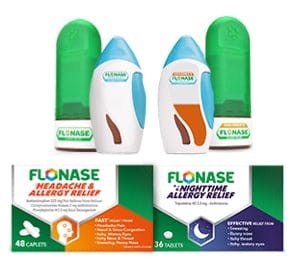.jpg?auto=format)
Compare Allergy Pills vs. Allergy Nasal Sprays
If you’ve always taken antihistamine pills to treat your allergies, using an allergy nasal spray may seem intimidating. But once you discover the benefits of using a nasal spray, you’ll wonder why you didn’t switch sooner.
Allergy Pills vs. Nasal Sprays: Application
Not all forms of allergy treatments work the same. Some come in the form of a tablet and are meant to be administered orally, while others come in the form of a nasal spray and are meant to be directly applied at the source—inside the nose.
What Is an Antihistamine?
Antihistamine pills block histamine—the chemical your body releases during an allergic reaction that causes your allergy symptoms. Available in the form of an oral pill or tablet, antihistamines can be prescribed or purchased over the counter. They relieve symptoms like a runny nose, itchy or watery eyes, hives and swelling. Unfortunately, one of the biggest side effects of antihistamine pills is drowsiness.1
What Is an Allergy Nasal Spray?
Allergy nasal sprays, or corticosteroid nasal sprays, soothe allergy symptoms by suppressing allergy inflammation at the source. Unlike most single-ingredient antihistamine pills, corticosteroid nasal sprays also treat nasal congestion.1
Allergy Pills vs. Nasal Sprays: SymptomsF
Some single-ingredient allergy pills like Claritin®, Zyrtec®, and Benadryl® don’t treat nasal congestion. Allergy nasal sprays, like FLONASE SENSIMIST, treat multiple allergy symptoms, including nasal congestion.*
Allergy Pills vs. Nasal Sprays: Side Effects
One of the most common side effects of single-ingredient antihistamines like Zyrtec® and Benadryl® is drowsiness.2,3 FLONASE SENSIMIST is non-drowsy.
FLONASE SENSIMIST is a great choice if you’re a long-time allergy-pill user making the transition to nasal sprays. It’s scent free, alcohol free, and virtually drip free. It creates a spray with a gentle mist that you’ll barely feel. With FLONASE SENSIMIST, you can treat your worst allergy symptoms once a day without needing an added antihistamine pill.
Indicated to relieve both nose- and eye-related† allergy symptoms, once-daily FLONASE SENSIMIST is the ideal form of treatment for controlling your allergies, so your allergies don’t control you.
What If I Don’t Like Nasal Sprays?
If you dislike nasal sprays, you’re probably treating your allergy symptoms with tablets or pills instead. However, many single-ingredient antihistamine pills don’t relieve nasal congestion, a common allergy symptom. If you’re looking for allergy relief in pill form, try Flonase Headache and Allergy Relief caplets, the first non-spray Flonase product that relieves headache and allergy symptoms, including nasal congestion.
*vs single antihistamines that do not treat nasal congestion.
† FLONASE SENSIMIST is indicated for itchy, watery eyes in adults and children 12 years of age and older. See product pages for full information.
Zyrtec® is a registered trademark of McNEIL-PPC, Inc.
Benadryl® is a trademark of Johnson & Johnson Consumer Inc., McNeil Consumer Healthcare Division.
Sources:
1. Allergy medications: Know your options - Mayo Clinic. https://www.mayoclinic.org/diseases-conditions/allergies/in-depth/allergy-medications/art-20047403. Accessed 6/10/22.
2. Zyrtec.com. Zyrtec Tablets. https://www.zyrtec.com/products/zyrtec-tablets. Accessed August 1, 2018.
3. Benadryl.com. Benadryl Allergy ULTRATAB Tablets. https://www.benadryl.com/products/benadryl-allergy-ultratab-tablets#warnings. Accessed August 1, 2018.
4. Kaiser HB, Naclerio RM, Given J, Toler TN, Ellsworth A, Philpot EE. Fluticasone furoate nasal spray: a single treatment option for the symptoms of seasonal allergic rhinitis. J Allergy Clin Immunol. 2007 Jun;119(6):1430-7. https://misuse.ncbi.nlm.nih.gov/error/abuse.shtml. Accessed August 16, 2018.





